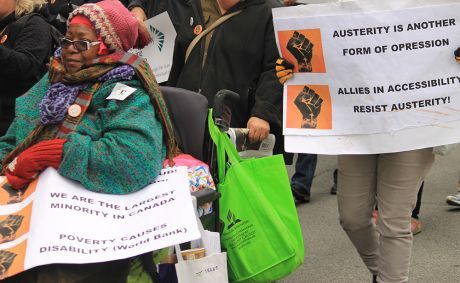Features
You are here
Trudeau’s ‘accessible Canada’ includes unpaid work

March 5, 2017
Back in 2015, before the Canadian federal election, a movement of disabled people was building across the country. The call for a barrier-free Canada was built in that time by a small, dedicated group of people who reinforced their message daily through social media and on the ground action. Their methods were so effective, that what began as a grassroots call for national solidarity grew into a campaign promise by Trudeau.
Managed consultations
What was mandated was more conversation, in the form of a seven month long cross-country consultation process with Canadian with disabilities. Consultations like these are a favored trend in the current federal government. Perhaps this is because they act as public evidence of some kind of action, regardless of how effective it is.
As expected, these events were heavily managed. They seemed designed to give the appearance of consent, rather than provide opportunities for consensus and moving forward. At the public consultations, any participant that was given time to speak was restricted to a two-minute limit; a method that was inaccessible for many participants. There was the impression that the people who spoke were expected to be grateful for the opportunity to share their perspective, even when it’s only taken in limited amounts.
There were impressions that a lot of what was being said was being filtered out, and reframed to fit an agenda. Any comments referring to issues of discrimination in immigration, affordable housing, poverty, or anything involving active redistribution was notably left out. There was some potential raised for amending some existing regulations, but little else. The focus was clearly centered on employment, while carefully avoiding much of what keeps most disabled people in poverty.
Unpaid work
As confirmed by a volunteer, this was a pattern across the country, but what was more surprising was the treatment of the volunteers themselves. Disabled people were brought in as volunteers to act as champions, panels and facilitators, and provide unpaid consultation. According to one such volunteer, what was expected of them could have amounted to a part-time job over a period of four months, including training, preparation and debriefing, all without paid compensation. Many people became reluctant to continue. Some of these volunteers continue to be contacted for ongoing unpaid sharing of their knowledge and expertise.
This is a significant problem, and one that many disabled people are familiar with: recognition of expertise without status or compensation. Volunteers were put in a position of either feeling exploited or declining their knowledge, while government representatives proclaimed the need for more jobs for disabled people within the consultations.
Instead of reaching out to offer paid work to disabled people, they paid consulting firms to find disabled people to consult with. They are doing market research rather than accepting the expertise of disabled people in designing policies or programs.
If the Trudeau government wanted to take a stand on something more effective for disabled people, they might start by taking a lead and offering meaningful skilled employment, but no one is calling them out.
If we want to see real change, we need to go back to where we started, back to the grassroots approach, and hold our representatives accountable for their ableist biases and charity model approach to accessibility. The consultations closed on February 28, but the notes will be made public. It’s on us to make them count.
Section:
Topics:









